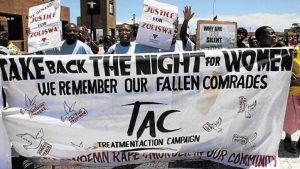
Nkonyana, described as a petite girl who could pose no physical threat to her assailants, was attacked by Lubabalo Ntlabathi, Sicelo Mase, Luyanda Londzi, and Mbulelo Damba, not too far from her home. Such brutal intolerance is common throughout the continent of Africa, where vestigial sodomy laws from the days of British colonialism linger in most countries, and is not even exceptional in South Africa, which officially supports a person’s choice to live a homosexual lifestyle. Homosexuals, though free to be who they are in South Africa, must endure an atmosphere of homophobia of such cruelty that lesbians are often targeted for “corrective rape” by men attempting to “cure” their homosexuality. “This court has a duty to show that intolerance — be it of race, sex, or religion — will not be allowed to go unpunished,” said Magistrate Raadiya Whaten.
It took six years of legislation, with 50 postponements, and with what many regard as poor police work and incompetent prosecution, but the case is considered a triumph for homosexual rights in South Africa. Hundreds of gay activists outside the court room cheered, raised their fists, and danced upon hearing the sentence.
“It was the first time discrimination based on sexual orientation was named as an aggravating factor in a South African criminal trial,” said the Triangle Project gay and lesbian rights group of Cape Town.
The case was important because the motive for the murder was clearly homosexual intolerance, and because the perpetrators remained unremorseful throughout the trial.
“It was truly a significant victory for us in terms of setting some kind of precedent for future cases that involve an element of hate or discrimination or bias in respect of sexual orientation,” said Jayne Arnott, the director of the Triangle Project. “The magistrate in the sentencing recognizes that Zoliswa had a right to live as she chose, as a lesbian in the community, and that there was a clear indication of intolerance and hatred towards her on these grounds.”
Gay rights activists worldwide realize that South Africa still has a way to go in realizing the rights of equality and nondiscrimination that are framed in its constitution and laws. Two men guilty of poaching rhinos in a national park were sentenced, last Tuesday, to 25 years in prison. Said David von Burgsdorff of rights group People again Suffering, Oppression and Poverty:
“I had no idea that for rhino poaching you can get a bigger sentence than for murdering somebody. That’s a bit of a jolt. [But] the sentence [upon Nkonyana’s murderers] could have been less also. We’re happy with it. We think justice has been served.”





































